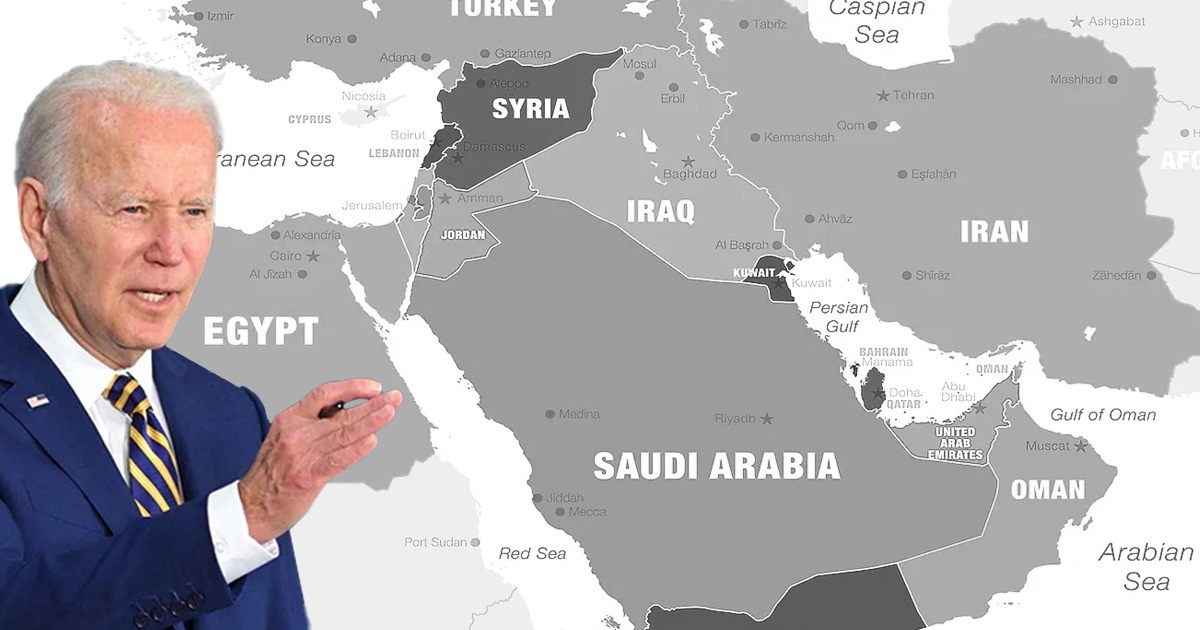US President, Joe Biden, is scheduled to visit Israel, Palestine, and Saudi Arabia between 13-16 July 2022. The main headlines about the trip focus on a deal to bring down gas prices. However, reportedly central to the visit are endeavors to further integrate Israel into the region, including through the establishment of an Arab-Israeli security alliance, led by the US, to confront Iran.
It is becoming clear that Biden’s Middle East policy, contrary to election pledges, is increasingly looking like a continuation and even deepening of that of Donald Trump, including by seeking to expand the Abraham Accords, which normalized diplomatic relations between Israel and Bahrain and the UAE, to Saudi Arabia. There have been reports circulating that the US may be offering a major security pact to regimes in the region¾ referred to by some as a Middle East NATO. This commits the US to defending the participant regimes and taking sides in their military conflicts, such as the war on Yemen. It would also cement a central role for Israel in the region, not just economically but also militarily and politically, notwithstanding Israel’s well-documented human rights violations, including war crimes and crimes against humanity.
As with Trump, Biden’s Middle East policy appears intended to marginalize the Palestinians. While formally still committed to the two-state solution, the Biden Administration has effectively abandoned efforts to constrain Israel’s policies and practices to make it impossible. Washington is even dragging its feet with respect to purely symbolic measures such as the announced reopening of the US Consulate in East Jerusalem, so as not to cast doubt on Israel’s unlawful annexation of the Holy City.
As members of the Global Network on the Question of Palestine,[i] we have strong reservations with respect to the further US and Arab policy shifts the above developments represent. We believe they amount to a repudiation of the international community’s responsibility to achieve a comprehensive, just, and durable peace that guarantees the inalienable rights of the Palestinian people.
Specifically, we remain convinced that the normalization of Arab-Israeli relations serves to undermine rather than promote peace and justice because such agreements are designed to perpetuate rather than dismantle the Israeli occupation of Arab territory. And it is that occupation, and more generally the systematic discrimination, oppression, subordination, and dehumanization by Israel’s government, military, settlers, and others–now authoritatively established to meet the definition of the crime against humanity of “apartheid” –that remain the primary obstacle to successful diplomacy.
Within the region, Arab leaders should realize that ongoing efforts to establish a US-led, Israeli-dominated military alliance will serve only to further polarization within and between their respective states. If Israel’s oppression of the Palestinian people may serve as an indicator of its future relations with other parts of the Arab world, its rapid encroachment into the Gulf and beyond should raise alarm bells at the highest echelons.
Arab leaders would do better to use their influence to promote an end to the occupation, the blockade of Gaza and all other manifestations of Israeli apartheid. Rather than sidelining the Palestinian people, they should reach out to the Palestinian leadership in both the Gaza Strip and the West Bank with the aim of promoting reconciliation, equality, and equity, as well as inclusion. Enlightened Arab leaders should also reach out to credible Palestinian grassroots movements and civil society representatives on either side of the Green Line and in exile in support of the Palestinian people’s struggle for freedom and justice. Finally, they should play a prominent role in coming to the rescue of UNRWA, the UN agency for the Palestinian refugees, both financially -Arab donors have decreased their support to UNRWA from 25% of the budget in 2018 to approximately 2% in 2021 – and politically. The same applies to the US.
As demanded by growing numbers of Democratic Party officials and activists, the Biden Administration should confront rather than endorse Israel’s systematic human rights violations. Washington’s downplaying of the murder of Palestinian journalist Shireen Abu Akleh, its inaction with respect to the settlements and settler violence, continued measures to forcibly displace Palestinians from their homes and lands, and above all its hostility to the consensus that Israel is beyond all reasonable doubt guilty of committing the international crime of apartheid needs to be urgently reversed.
[i] For more information about the Global Network on the Question of Palestine (GNQP) click here.


